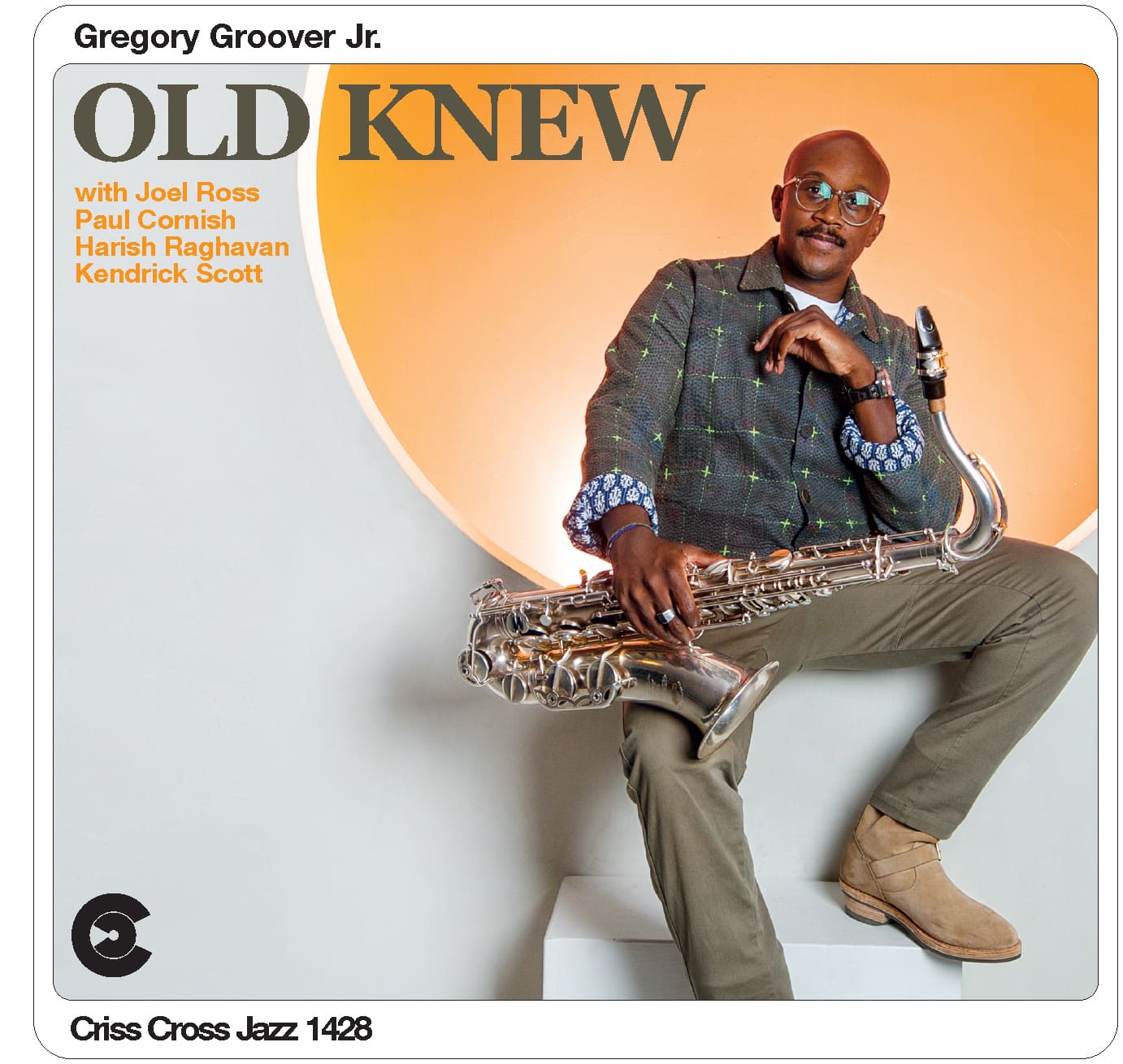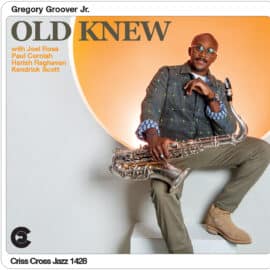| Jazz |

The first thing you notice when Gregory Groover Jr. lifts his saxophone isn’t the tone itself, but the breath that precedes it, a deep, deliberate inhale that seems to draw in more than air. What follows feels less like music than invocation: a voice emerging through metal and reed, warm, human, and reverent. His horn doesn’t just play; it speaks, prays, exhales. Each note feels like a continuation of a sermon whispered generations ago, echoing from the pews of the Charles Street AME Church in Boston, where Groover’s father has preached for decades and where the saxophonist learned that sound, when honest, could be a form of grace.
At 32, Groover stands among the most compelling voices in a rising generation of jazz musicians who are reshaping the idiom from within. His new album, “Old Knew”, is both a return and a revelation, a work that honors tradition while insisting on the urgency of the present.
On its surface, it’s the kind of record that could have been made at any moment in jazz history: intricate compositions, fluid interplay, a group of brilliant musicians engaged in the art of conversation. Yet underneath that classic architecture runs something timeless and radical: a declaration of faith in sound itself, in its power to heal, provoke, and testify.
Groover’s quintet spans nearly two decades of experience, creating a musical dialogue that bridges eras. Vibraphonist Joel Ross, 30, provides a crystalline shimmer; pianist Paul Cornish, still in his twenties, injects the restless energy of discovery; drummer Kendrick Scott and bassist Harish Raghavan, both in their forties, ground the ensemble in depth and wisdom. Together they move like a single, breathing organism, chasing grooves that spiral and shift but never lose their center. The result is a record that sounds alive in the truest sense, vital, alert, searching.
“I wanted this one to feel different,” Groover says. “ Lovabye had a clear narrative thread; it was about composition, structure, and mood. *Old Knew* is about trust, trust in the players, trust in the energy of the moment, and trust in myself.”
That trust extends to his producer, the acclaimed saxophonist Walter Smith III, once a hero to the younger Groover, now a mentor and collaborator. Both are Blue Note artists, both educators at Berklee College of Music, and both share an interest in balancing intellect and intuition, scholarship and soul. Groover currently serves as assistant chair of Berklee’s ensemble department and, this year, as acting director of the Global Jazz Institute founded by Danilo Pérez, an institution where mentorship, community, and global consciousness intersect.
“Greg has always had that deep connection to the spiritual side of music,” Pérez recalls. “His sound has that vocal quality, you hear the church in it. It’s storytelling through tone. There’s energy, but there’s also restraint. He’s grounded, emotionally and musically.”
That grounding has roots as deep as the gospel tradition itself. Groover’s 2019 album, Negro Spiritual Songbook, Vol. 2 (The Message), was an act of translation,a bridge between sacred song and modern jazz vocabulary. It reimagined spirituals not as historical relics but as living theology, the same kind of radical, embodied faith that runs through the work of Mary Lou Williams or John Coltrane. “Growing up, music was everywhere,” Groover says. “I learned that it wasn’t about performance, it was about testimony. The idea that sound could move people closer to something greater than themselves.”
That belief continues to shape his art, but “Old Knew” widens the frame. The album moves beyond devotion to something broader: a meditation on inheritance and innovation, on what it means to belong to a lineage while refusing to be confined by it. Its very title “Old Knew” suggests a paradox, the idea that what is ancient can still be reborn, that knowledge doesn’t expire but transforms.
Across its tracks, Groover and his band explore that transformation through sound. The pieces are rhythmically intricate, yet open; harmonically rich, yet never dense. There’s a sense of light running through them, a luminous optimism that recalls the exploratory spirit of Weather Report or Joe Zawinul’s later work. But where those groups often sought transcendence through electricity and abstraction, Groover reaches for it through humanity and breath.
He attributes part of that warmth to the musicians themselves. “I’ve been blessed to play with people who listen deeply,” he says. “When you have that level of listening, you don’t need to fill space, you can let the music speak. It’s about collective energy, not control.”
That collective energy is palpable on tracks like “Pulse of Knowing” and “Between Faith and Fire,” where rhythm becomes revelation, and every phrase feels suspended between contemplation and release. The album never settles into comfort; it propels itself forward, like a conversation that refuses to end. Each player contributes not just notes but perspective, a lived history of jazz filtered through different generations and geographies.
Groover’s own perspective straddles the sacred and the academic. As a pastor’s son and a professor, he embodies two parallel forms of calling: ministry and mentorship. Both, in his view, demand listening as much as speaking. His tone, round, expressive, almost vocal, suggests someone in dialogue with both his ancestors and his students. He talks often about the “urgency of communication,” the need to make the invisible audible. “Creation isn’t optional,” he says. “It’s necessary. It’s how we process what we live.”
That necessity gives “Old Knew” its emotional core. Even in its quietest moments, there’s a pulse of insistence, a feeling that every phrase carries something essential, something that needs to be said before the breath runs out. You can sense that same urgency in the way Groover improvises: deliberate, unhurried, yet never tentative. He plays as if each note must earn its right to exist.
And yet for all its gravity, the album is not solemn. It radiates joy, the kind that comes from creative communion, from musicians who trust one another enough to take risks. That joy, Groover says, is a form of gratitude: gratitude for his mentors, for his peers, for the tradition that raised him, and for the privilege of adding his own voice to the chorus.
“I know what I know,” he says with quiet conviction. “I trust that what I’ve carried since the beginning is enough. But I also trust the wisdom others have given me. That’s what makes this music what it is, it’s not just mine. It belongs to everyone who shaped it.”
In that statement lies the paradox at the heart of “Old Knew”: that jazz, like faith, is both personal and communal, old and ever-renewing. Groover’s music doesn’t just celebrate that truth, it lives inside it.
And as his horn rises one more time, full of breath and brilliance, you can almost hear the past and the future merging into the same luminous sound: a testament not only to where jazz has been, but to where it can still go when played with conviction, humility, and love.
Thierry De Clemensat
Member at Jazz Journalists Association
USA correspondent for Paris-Move and ABS magazine
Editor in chief – Bayou Blue Radio, Bayou Blue News
PARIS-MOVE, October 20th 2025
Follow PARIS-MOVE on X
::::::::::::::::::::::::
Musicians :
- Joel Ross – vibraphone
- Kris Davis – piano
- John Lockwood – acoustic bass
- Charles Haynes – drum set
- Gregory Groover Jr. – leader/tenor sax
Track Listing :
- Spaces (3:27)
- 551 (7:00)
- Go for Broke (4:45)
- Rain Shall Fall (5:48)
- Retrogade (6:38)
- Sumner (3:03)
- Good Sir (5:07)
- Juanita and Betty (3:36)
- William and Vinson (4:40)
- Old Knew (7:33)
- Arrivals (2:02)
Recorded January 6, 2025 in New York City, NY, USA
Engineer: Chris Allen (recording) & Ryan Renteria (editing) & Michael Marciano (mixing/ mastering)
Producer: Walter Smith III & Jerry Teekens (executive)

